Trump’s team explores a plan for gradual tariff increases, utilizing powers from the International Emergency Economic Powers Act. Sources indicate that Trump proposed minimum tariffs of 10% to 20% on all imported goods and over 60% on shipments from China.
Advisors consider a tiered tariff program that would raise tariffs by 2% to 5% monthly. This proposal remains in the early stages and has not yet reached Trump, signaling that discussions continue among his team.
Key advisors involved in this plan include Scott Bessent, a candidate for Treasury Secretary, Kevin Hassett, set to lead the National Economic Council, and Stephen Miran, nominated to head the Council of Economic Advisors.
These individuals requested anonymity to discuss internal deliberations. Neither Hassett nor Bessent’s representatives responded to requests for comments. Miran also declined to comment.
A spokesperson for Trump’s transition team referred to the president-elect’s previous public statements and social media posts regarding tariffs. Following the report, the Chinese yuan and other currencies sensitive to its economy strengthened.
 Trump’s Team Considers Gradual Tariff Increases Under Emergency Powers. (Photo Internet reproduction)
Trump’s Team Considers Gradual Tariff Increases Under Emergency Powers. (Photo Internet reproduction)The yuan increased by 0.1% during Asian trading on Tuesday, while the Australian dollar rose by 0.3%. China has intensified support for the yuan, which remains near its historical low.
Trade Wars and Economic Uncertainty
Investors anticipate that Beijing may allow further depreciation if Trump enforces higher tariffs on Chinese exports. During his 2024 presidential campaign, Trump emphasized his plan to impose minimum tariffs of 10% to 20% on all imports.
He also proposed tariffs exceeding 60% on Chinese goods. Since his election victory in November, reports have emerged detailing how aggressively he plans to implement these tariffs.
Trump himself dismissed claims of a moderate approach as false. This uncertainty leaves investors and businesses on edge. The S&P 500 index fell below its pre-election level from November 5 but later recovered.
Recently, investors have sold off Treasury bonds due to fears of persistent inflation partly linked to new tariffs, creating headwinds for stocks and the broader economy.
With just a week until inauguration, economists can only speculate about how Trump’s trade wars will impact the economy. This situation complicates matters for the Federal Reserve, as Trump’s tariff threats pose risks to growth prospects while potentially fueling inflation if countries retaliate.
Kristalina Georgieva, Managing Director of the International Monetary Fund, noted that these tariff threats already elevate long-term borrowing costs globally.
She explained that uncertainty surrounding the next administration’s trade policies adds challenges to the global economy and manifests through higher long-term interest rates, even as short-term rates decline—a notably unusual combination.

 By The Rio Times | Created at 2025-01-14 23:03:15 | Updated at 2025-01-15 05:24:57
7 hours ago
By The Rio Times | Created at 2025-01-14 23:03:15 | Updated at 2025-01-15 05:24:57
7 hours ago








